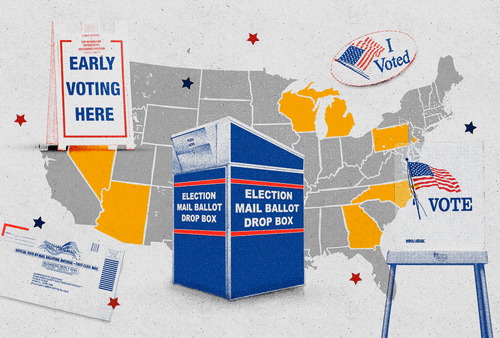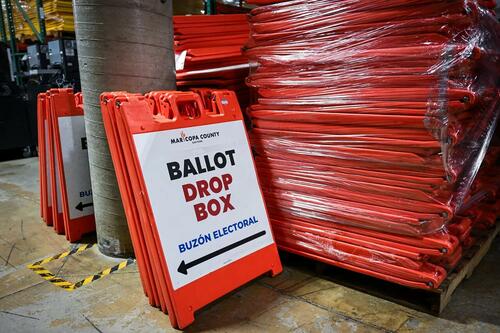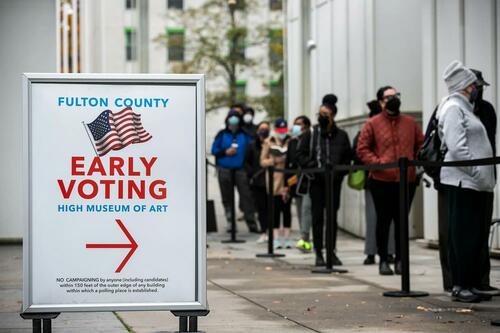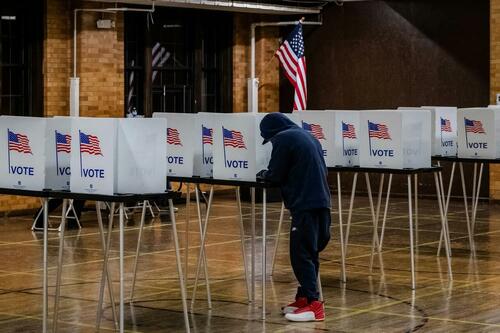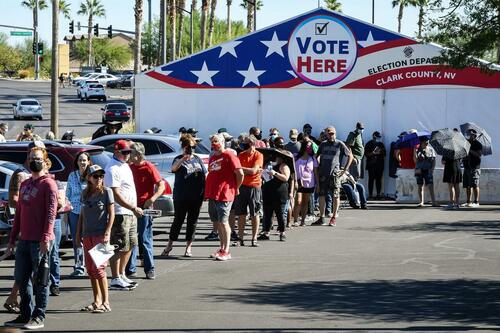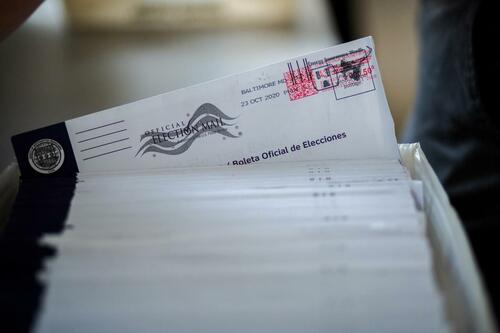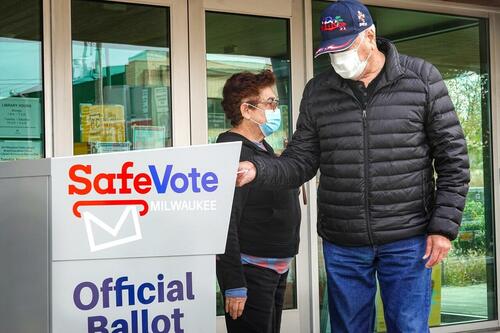Early Voting, Mail-In Ballots, And Drop-Boxes: The Rules In Each Battleground State
Authored by Nathan Worcester via The Epoch Times,
Many Americans yearn for a simple, one-day election. For now, though, national elections are sprawling, weeks-long “election seasons” that differ significantly from place to place…
Voting in America’s major battleground states is varied and, in some cases, controversial. All seven allow for “no-excuse” absentee or mail-in voting, meaning any registered voter can vote by mail (without needing an excuse such as disability or unavailability). Virtually all permit drop boxes.
Less controversially, under the Uniformed and Overseas Citizens Absentee Voting Act (UOCAVA), ballots are often sent to military and overseas voters weeks earlier than other voters.
In-person early voting will start throughout most battlegrounds by mid to late October.
Wisconsin and Pennsylvania have no formal in-person early voting. However, voters there, as in most other battleground states, can deliver mail-in ballots by hand to local election offices and drop boxes.
Under Pennsylvania law, counties in that state could normally have initiated mail-in ballot processing as early as Sept. 16, fifty days ahead of Election Day, on Nov. 5.
However, challenges to candidates’ nominations have kept Pennsylvania’s Department of State from confirming the certified candidates.
The start of mail-in voting in the Keystone State is still up in the air.
“When we receive the certified list, we will announce the date that absentee and mail-in ballots will be available through social media and an announcement on our website,” Stephanie Reid, director of election administration for Philadelphia, told The Epoch Times via email.
In Wisconsin, ballot drop boxes outside municipal clerk offices were illegal until July 2024, when the state supreme court overruled its 2022 decision restricting them.
Read on to learn more about pre-Election Day voting in seven 2024 battleground states…
Arizona
In-person early voting begins on Oct. 9, 27 days before Election Day. It lasts until Nov. 1 at 7 p.m.
An emergency early voting period begins on Nov. 1 and lasts through 5 p.m. on Nov. 4, the day before Election Day, for voters who are “experiencing an emergency between 5 p.m. on the Friday preceding the election and 5 p.m. on the Monday preceding the election.”
Stacks of ballot drop box signs sit in storage at the Maricopa County Tabulation and Election Center ahead of the 2024 Arizona primary and general elections in Phoenix on June 3, 2024. Patrick T. Fallon/AFP via Getty Images
In addition, Arizona counties begin sending out absentee ballots on Oct. 9 to voters who make a one-time request or who are on the state’s Active Early Voting List.
Oct. 9 is also when voters can start mailing those ballots back or placing them in drop boxes.
The deadline for ballots to reach officials is 7 p.m. on Election Day.
The Arizona Elections Procedure Manual charges local government units that have drop boxes with “develop[ing] and implement[ing] procedures to ensure [their] security.”
Ahead of its plans to monitor drop boxes, the Conservative Political Action Conference (CPAC) Foundation wrote to Arizona Secretary of State Adrian Fontes last month seeking guidance.
Conservative groups’ drop box monitoring in the state in 2022 was marked by controversy.
A federal judge ordered one group, Clean Elections USA, to keep a 250-foot distance from drop boxes in the run-up to Election Day.
“To come out and pretend like you recognize the problem and that you want to help is so disingenuous when you’re a part of the problem,” Aaron Thacker, a spokesman for Fontes, said in response to the CPAC letter.
Georgia
Oct. 15 marks the start of in-person early voting in the Peach State, where it’s also called advance voting.
Advance voting ends at 5 p.m. on Friday, Nov. 1.
State law mandates at least one drop box per county, while county registrars have some discretion to add more based on population or advance voting site numbers.
Voters line up for the first day of early voting outside a polling station in Atlanta on Dec. 14, 2020. Jessica McGowan/Getty Images
Per state law, “the drop box location shall have adequate lighting and be under constant surveillance by an election official or his or her designee, law enforcement official, or licensed security guard.”
Georgia voters must request absentee ballots to receive them. They will be sent out starting on Oct. 7.
Voters can mail in those ballots, hand-deliver them to their county registrar, or drop them at a drop box in their county.
The deadline for receipt is the close of polls on Election Day. Absentee ballots received after that date must be destroyed.
Michigan
In Michigan, communities may provide early in-person voting as soon as Oct. 7, 29 days before Election Day.
A mandatory early voting period commences nine days ahead of Nov. 5, on Oct. 26.
Early in-person voting is still a novelty in Michigan.
Voters approved it through a November 2022 ballot initiative, Michigan Proposal 2, that amended the state constitution.
The measure also mandated drop boxes be placed in every municipality in the state and enabled voters to join a permanent absentee ballot list.
Drop boxes must stay open 24 hours a day starting 40 days before Election Day, or Sept. 26, and until 8 p.m. on Election Day.
Absentee ballots also have to be available from that date.
A resident casts his vote at Berston Fieldhouse in Flint, Mich., on Nov. 3, 2020. Seth Herald/AFP via Getty Images
The election clerk must receive those absentee ballots prior to the close of polls on Election Day. Otherwise, the ballots won’t be counted.
Per state law, drop boxes must be video monitored on Election Day and over the preceding 75 days.
But there’s an exception for drop boxes ordered or installed before Oct. 1, 2020, that lasts until Jan. 1, 2026, more than a year after Election Day 2024.
For now, those drop boxes have been grandfathered in and need not be video monitored.
Nevada
In-person early voting in Nevada starts on Oct. 19 and continues through Nov. 1.
The state has universal mail-in voting. All active registered voters will receive a ballot in the mail unless they opt out.
Those ballots must be prepared and distributed to in-state voters “not later than 20 days before the General Election”—in this case, by Oct. 16.
If they are hand delivering mail-in ballots to drop boxes or county clerks, they must do so by the close of polls on Election Day—7 p.m.
If they are mailing those ballots, they must be postmarked on or before Election Day and received by 5 p.m. on Nov. 9, four days after the election.
Drop boxes are located at all polling places, including early voting polling places.
People line up to vote at a shopping center on the first day of in-person early voting in Las Vegas on Oct. 17, 2020. Ethan Miller/Getty Images
In addition, per state law, “a county clerk may establish a ballot drop box at any other location in the county where mail ballots can be delivered by hand and collected during the period for early voting and on election day.”
The statute does not mandate video monitoring, though it does call for drop boxes to be made of “metal or any other rigid material of sufficient strength and resistance to protect the security of the mail ballots.”
North Carolina
In-person early voting starts in North Carolina on the third Thursday before Election Day.
This year, that is Oct. 17.
That period ends at 3 p.m. on Nov. 2. Absentee voting would normally be starting much sooner.
Counties were preparing to send absentee ballots earlier this month, in line with state law requiring those ballots be sent 60 days ahead of Election Day in an even-numbered year.
But after the North Carolina Supreme Court ruled to strike Robert F. Kennedy Jr.’s name from ballots, county boards of elections throughout the state are printing new ballots.
Robert F. Kennedy Jr. speaks to reporters at the Pennsylvania Convention Center ahead of the presidential debate between former President Donald Trump and Vice President Kamala Harris in Philadelphia on Sept. 10, 2024. Madalina Vasiliu/The Epoch Times
According to a press release from the North Carolina State Board of Elections, that’s likely to occur “in the next couple weeks.”
North Carolina’s absentee ballots must also be completed with either two witnesses or a notary public observing. Witnesses should track the fact that the ballot is marked but not how the person votes.
The state has greatly tightened its election laws in recent years, including through a voter ID requirement for mail-in voters.
Drop boxes aren’t permissible for absentee voting in the state. Voters can hand off absentee ballots to the county board by 7:30 p.m., Election Day, or at early voting locations during the early voting window.
Mailed absentee ballots must be received by 7:30 p.m. on Election Day.
A recent bill from the Republican-dominated state Legislature removed a three-day grace period for ballots postmarked by Election Day.
Although Gov. Roy Cooper, a Democrat, vetoed the measure, lawmakers overrode his veto in late 2023.
Pennsylvania
In-person early voting is not technically an option in Pennsylvania. However, as discussed above, voters can start returning mail-in or absentee ballots in person weeks before Election Day.
Until candidate nomination challenges are resolved, however, mail-in and absentee ballots will not be available to Pennsylvanians.
Election officials must receive mail-in and absentee ballots by 8 p.m. on Nov. 5, Election Day.
“A postmark by 8 p.m. Nov. 5 is not sufficient,” a state elections webpage notes.
Pennsylvania State Senate Bill 99, reintroduced earlier this year after passing the Senate under a different name in 2022, aims to get rid of drop boxes and satellite election offices.
Counties in the state are currently permitted to operate such sites.
Electoral workers organize ballots to be counted at Northampton County Courthouse in Easton, Pa., on Nov. 3, 2020. Kena Betancur/AFP via Getty Images
State Sen. Cris Dush, a Republican, pledged in a statement on the legislation that it would “eliminate ballot stuffing.”
Common Cause Pennsylvania has opposed the measure. Its executive director called drop boxes “safe and secure” for voting.
The bill passed the State Government Committee in March but has languished after being re-referred to an appropriations committee in May.
Wisconsin
As in Pennsylvania, in-person early voting isn’t a stand-alone option in America’s Dairyland. However, Wisconsinites can vote absentee by mail or in person.
As in North Carolina, Kennedy is challenging his continued presence in the election after dropping out.
He has filed an appeal with the state’s District 2 Court of Appeals after the Wisconsin Elections Commission (WEC) voted in late August to leave him on ballots there.
Once official ballots are in, municipal clerks must send absentee ballots by Sept. 19 to voters with requests on file.
They must be returned to those clerks by 8 p.m. on Election Day, Nov. 5.
Residents drop mail-in ballots in an official ballot box outside a library in Milwaukee on Oct. 20, 2020. Scott Olson/Getty Images
Drop boxes are legal in the state thanks to a July ruling from the Wisconsin Supreme Court.
“The decision held that state law permits clerks to lawfully utilize secure drop boxes.
“The decision did not provide guidance on what it means for a drop box to be ‘secure,’” WEC wrote in July guidance on the ruling.
It went on to recommend best practices for drop box security.
The guidance notes that private citizens can monitor public drop boxes, “but not if the watching interferes with voting,” citing Wisconsin laws that punish the interruption or prevention of voting, including one statute that is a Class 1 felony.
Tyler Durden
Mon, 09/16/2024 – 15:45
via ZeroHedge News https://ift.tt/y8P9SJh Tyler Durden
